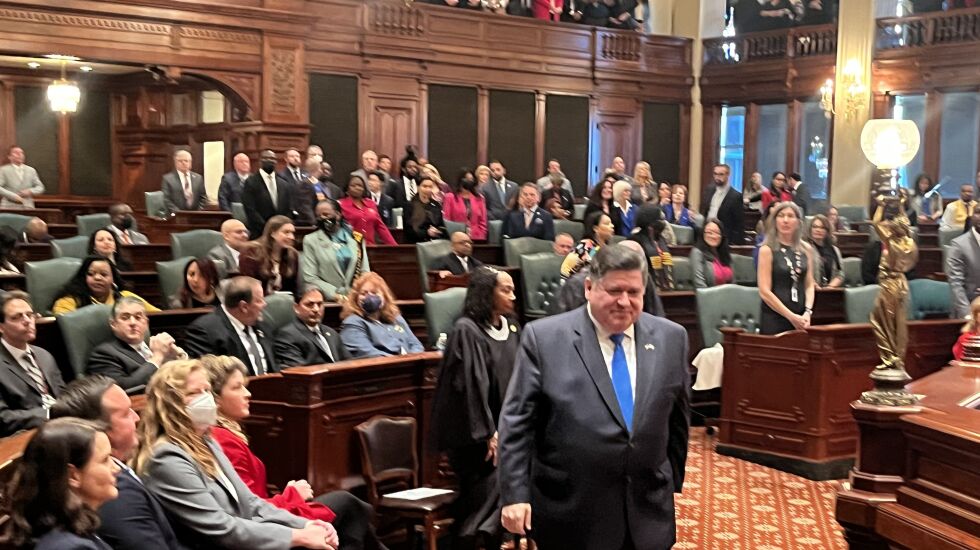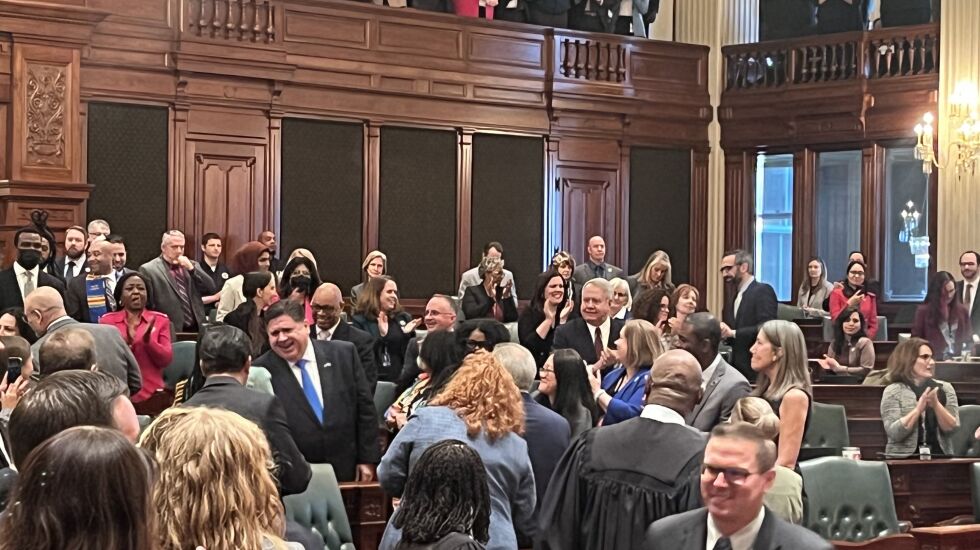
SPRINGFIELD — Touting the state’s “remarkable” fiscal progress despite expectations of a recession, Gov. J.B. Pritzker on Wednesday unveiled a $49.6 billion spending plan that includes a major boost to education funding in the state — including a $250 million investment in early education and a $506 million increase in K-12 funding.
The Democratic governor’s 51-minute budget and State of the State address was heavy on policy — with sprinkles of political jabs that had Democrats applauding on their feet and Republicans shaking their heads.
“This afternoon I’ve laid out a budget agenda that does everything possible to invest in the education of our children,” Pritzker said.
“Yet it’s all meaningless if we become a nation that bans books from school libraries about racism suffered by Roberto Clemente and Hank Aaron, and tells kids they can’t talk about being gay, and signals to Black and Brown people and Asian Americans and Jews and Muslims that our authentic stories can’t be told.”
Education, human services, pensions and health care would receive a large majority of the $49.6 billion spending proposal — as the state projects a general revenue forecast of $49.94 billion, a 2.8% decrease from revised estimates.
Funding for K-12 education would receive a $506 million boost — including an increase of $350 million to the state’s evidence-based funding formula, which helps distribute funds based on need. Another $70 million would go to launch a three-year pilot program aimed at improving the teacher pipeline — and $86.4 million would go toward grants for transportation and special education.
Pritzker’s education funding — which makes up 20.5% of his spending plan — includes a $75 million early childhood block grant at the Illinois State Board of Education that will create 5,000 preschool spots for Illinois children and $130 million to begin funding Childcare Workforce Compensation Contracts to give child care workers a raise. The governor’s office said Chicago Public Schools would receive 37% of the block grant.
Pritzker’s first budget proposal of his second term also includes an increase of $100 million to the Monetary Award Program, or MAP, which will allow students at or below the median income level to go to community college for free — through a combination of MAP and Pell grant funding. The proposal also includes a $100 million increase for public universities and community colleges.

While many applauded the education funding, the Chicago Teachers Union on Wednesday said the $350 million proposal for the school funding formula isn’t enough. The union said Pritzker should instead invest $750 million.
“The state’s evidence-based funding model remains billions of dollars short every year, reinforcing a structural inequity that harms hundreds of classrooms and school communities throughout our state, including Chicago,” the union said in a statement.
“Those districts, like ours, serve predominantly low-income students and the most significant number of Black and brown children in Illinois. Regrettably, the inability of the state to adequately fund the EBF will continue a decades-long neglect of our state’s neighborhood public schools and will jeopardize the education of our most vulnerable students.”
Pritzker also touted the state’s payoff of $17 billion in overdue bills and the addition of $2.3 billion to the state’s Rainy Day Fund as proof that the state’s fiscal progress is “remarkable.”
“Fiscal responsibility isn’t easy, nor is it a one-time fix. It’s an annual effort that requires persistence. It requires conservative revenue estimates, as all of my budget proposals have,” Pritzker said. “But when done right, consistent balanced budgets strengthen the institutions our residents rely upon, create new opportunities for success, and make life easier for the people of Illinois.”
The governor’s proposal also includes a pension contribution of $9.8 billion — with an additional contribution of $200 million this year, on top of the $500 million added in fiscal years 2022 and 2023, to reduce pension liability by an estimated $2.4 billion. The state currently has $139.7 billion in funded pension liability across its five retirement systems.
Republicans who have, for years, complained that Democrats in Illinois continue to raise spending levels without enough revenue and support to back it up, sounded the alarm after Pritzker’s speech.
“Today we heard a long list of expensive promises totaling $2.7 billion in new spending, when the Governor himself projects revenue to be down $1.42 billion,” Illinois House Republican Leader Tony McCombie, R-Savannah, said in a statement. “This will require future tax increases or cuts to vital programs serving our most vulnerable.”
Illinois Senate Republican Leader John Curran, R-Downers Grove, too, warned about added spending.
“We must heed the warnings of [Illinois] Comptroller [Susana] Mendoza and be disciplined in our fiscal approach at a time when we are likely to experience a recession,” Curran said. “We must stop the Democratic majority from spending us into a tax increase.”







